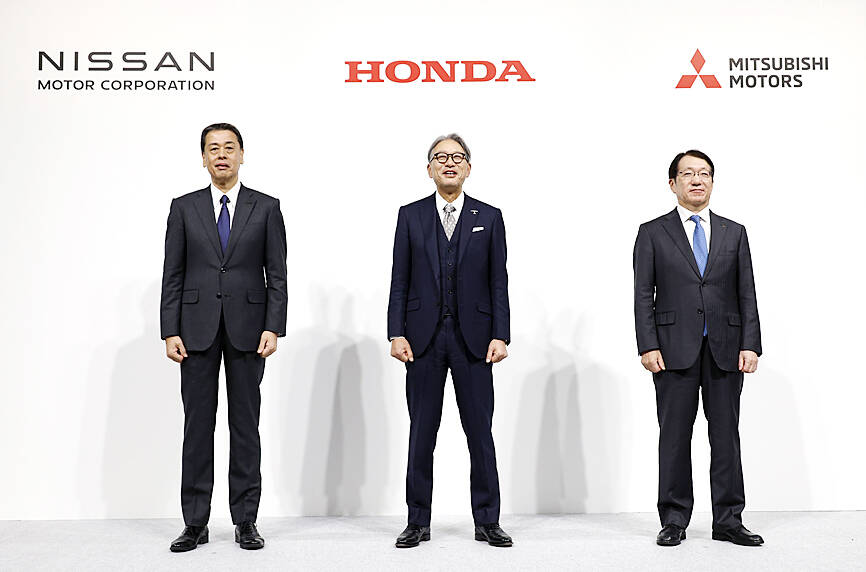Japanese auto giants Honda Motor Co and Nissan Motor Co yesterday agreed to launch talks on a merger seen as a bid to catch up with Chinese rivals and Tesla Inc on electric vehicles.
Their collaboration would create the world’s third-largest automaker, expanding development of electric vehicles and self-driving technolgy while coming to the rescue of struggling Nissan.
The two firms along with Mitsubishi Motors Corp said they had signed a memorandum of understanding to start discussions on integrating their business under a new holding company.

Photo: EPA-EFE
Citing “dramatic changes in the environment surrounding both companies and the automotive industry,” a joint statement said that they planned to list the holding company on the Tokyo Stock Exchange in August 2026.
Honda and Nissan — Japan’s No. 2 and No. 3 automakers after Toyota Motor Corp — want to seal the merger deal in June next year, but it is unlikely to be a marriage of equals.
Honda would nominate the president of the new holding company, whose board would be mostly made up of Honda executives, the statement said.
“Mitsubishi Motors aims to reach its conclusion by the end of January 2025 on the participation or involvement in the business integration between Nissan and Honda,” it added.
Nissan is a majority shareholder of Mitsubishi Motors.
“We anticipate that if this integration comes to fruition, we will be able to deliver even greater value to a wider customer base,” Nissan chief executive officer Makoto Uchida said in a statement.
Lackluster consumer spending and stiff competition in several markets have made life hard for many automakers.
Business has been especially tough for foreign brands in China, where electric vehicle manufacturers such as BYD Co (比亞迪) are leading the way as demand grows for less polluting vehicles.
China overtook Japan as the biggest vehicle exporter last year, helped by government support for the industry.
Honda and Nissan’s partnership could include a manufacturing tie-up where they build vehicles at each other’s plants, Kyodo News reported.
“We hope Japanese companies will take steps to respond to these changes, and take measures to survive and win amid international competition,” Japanese Chief Cabinet Secretary Yoshimasa Hayashi said yesterday.
He declined to comment on the merger reports, but highlighted the “importance of strengthening competitiveness in areas such as ... batteries and in-vehicle software.”
Nissan last month announced thousands of job cuts as it reported a 93 percent plunge in first-half net profit.
Kyodo said that Honda would ask Nissan to achieve a “V-shaped recovery” in performance as a condition for the merger.
Honda and Nissan in March already agreed to explore a strategic partnership on software and components for electric vehicles, among other technologies. The partnership was joined in August by Mitsubishi Motors.
However, former Nissan chief executive Carlos Ghosn cast doubt on the success of a potential merger between Honda and Nissan, saying the latter's plans "do not make sense."
"From an industrial point of view, there is duplication everywhere" between the two firms, Ghosn said, saying complementarity was necessary in a merger but none existed between Honda and Nissan.
"If this merger takes place ... personally I don't think it's going to be successful," he added, speaking online from Lebanon, where he is currently based.
Additional reporting by Reuters

Intel Corp chief executive officer Lip-Bu Tan (陳立武) is expected to meet with Taiwanese suppliers next month in conjunction with the opening of the Computex Taipei trade show, supply chain sources said on Monday. The visit, the first for Tan to Taiwan since assuming his new post last month, would be aimed at enhancing Intel’s ties with suppliers in Taiwan as he attempts to help turn around the struggling US chipmaker, the sources said. Tan is to hold a banquet to celebrate Intel’s 40-year presence in Taiwan before Computex opens on May 20 and invite dozens of Taiwanese suppliers to exchange views

Application-specific integrated circuit designer Faraday Technology Corp (智原) yesterday said that although revenue this quarter would decline 30 percent from last quarter, it retained its full-year forecast of revenue growth of 100 percent. The company attributed the quarterly drop to a slowdown in customers’ production of chips using Faraday’s advanced packaging technology. The company is still confident about its revenue growth this year, given its strong “design-win” — or the projects it won to help customers design their chips, Faraday president Steve Wang (王國雍) told an online earnings conference. “The design-win this year is better than we expected. We believe we will win

Quanta Computer Inc (廣達) chairman Barry Lam (林百里) is expected to share his views about the artificial intelligence (AI) industry’s prospects during his speech at the company’s 37th anniversary ceremony, as AI servers have become a new growth engine for the equipment manufacturing service provider. Lam’s speech is much anticipated, as Quanta has risen as one of the world’s major AI server suppliers. The company reported a 30 percent year-on-year growth in consolidated revenue to NT$1.41 trillion (US$43.35 billion) last year, thanks to fast-growing demand for servers, especially those with AI capabilities. The company told investors in November last year that

Power supply and electronic components maker Delta Electronics Inc (台達電) yesterday said it plans to ship its new 1 megawatt charging systems for electric trucks and buses in the first half of next year at the earliest. The new charging piles, which deliver up to 1 megawatt of charging power, are designed for heavy-duty electric vehicles, and support a maximum current of 1,500 amperes and output of 1,250 volts, Delta said in a news release. “If everything goes smoothly, we could begin shipping those new charging systems as early as in the first half of next year,” a company official said. The new